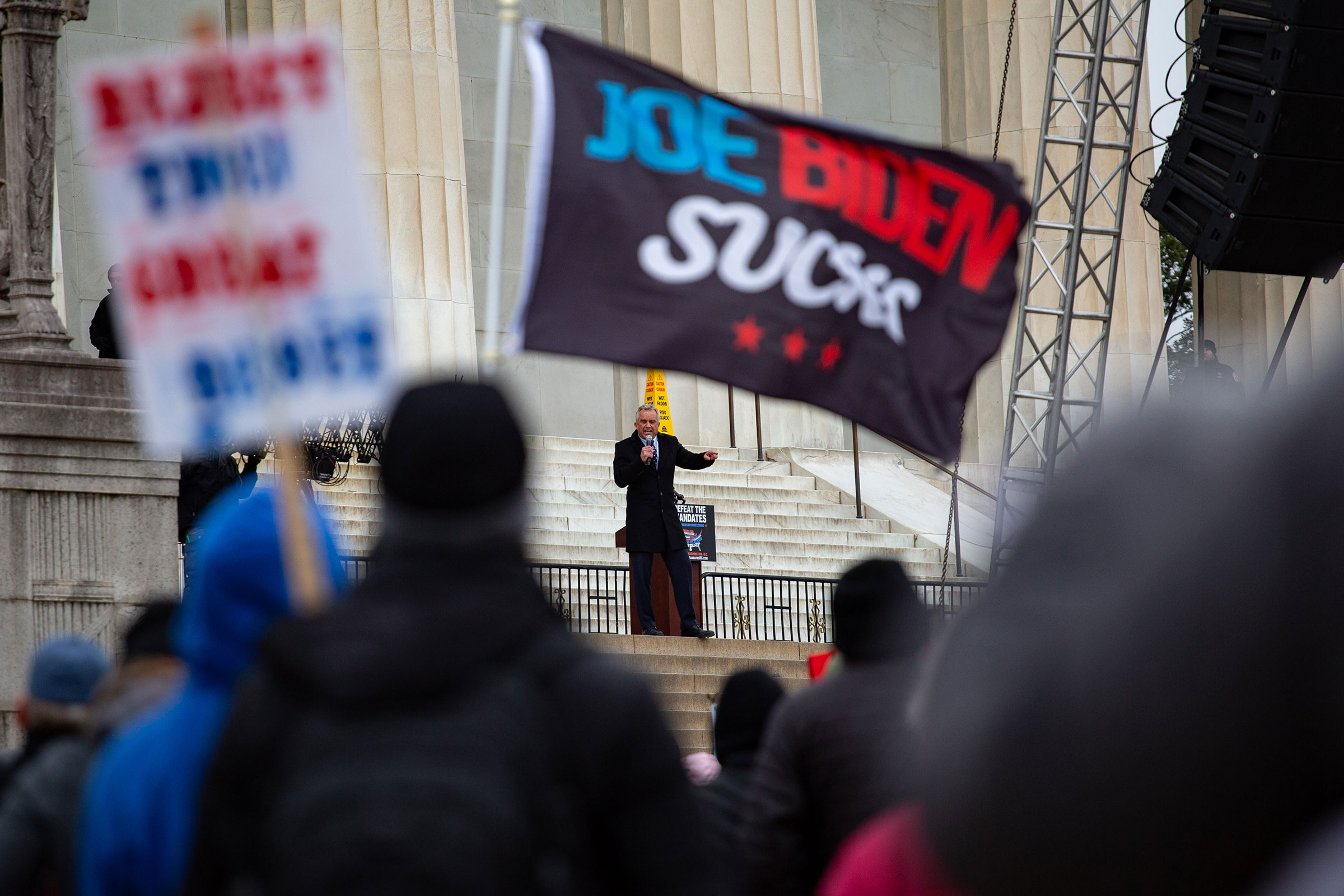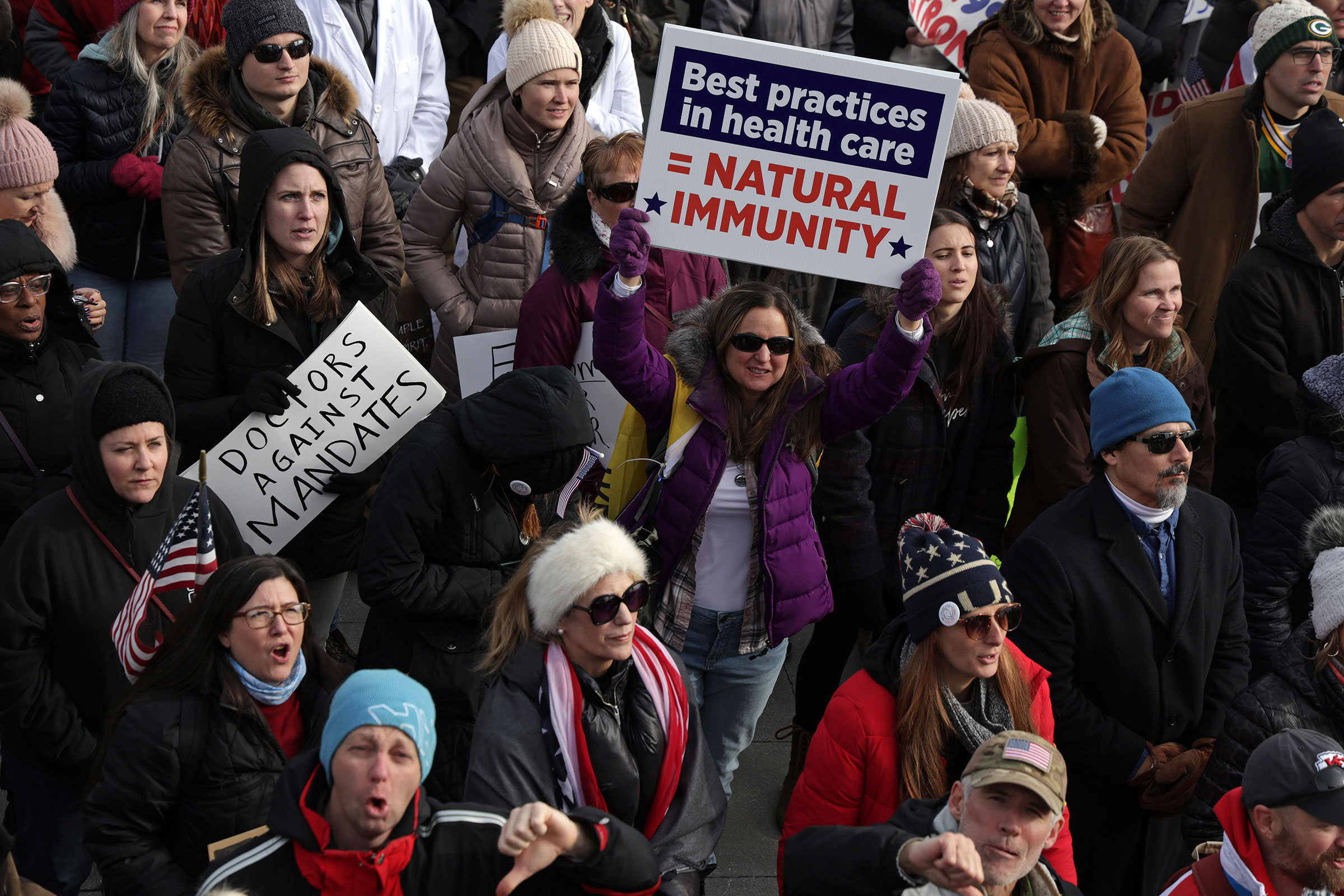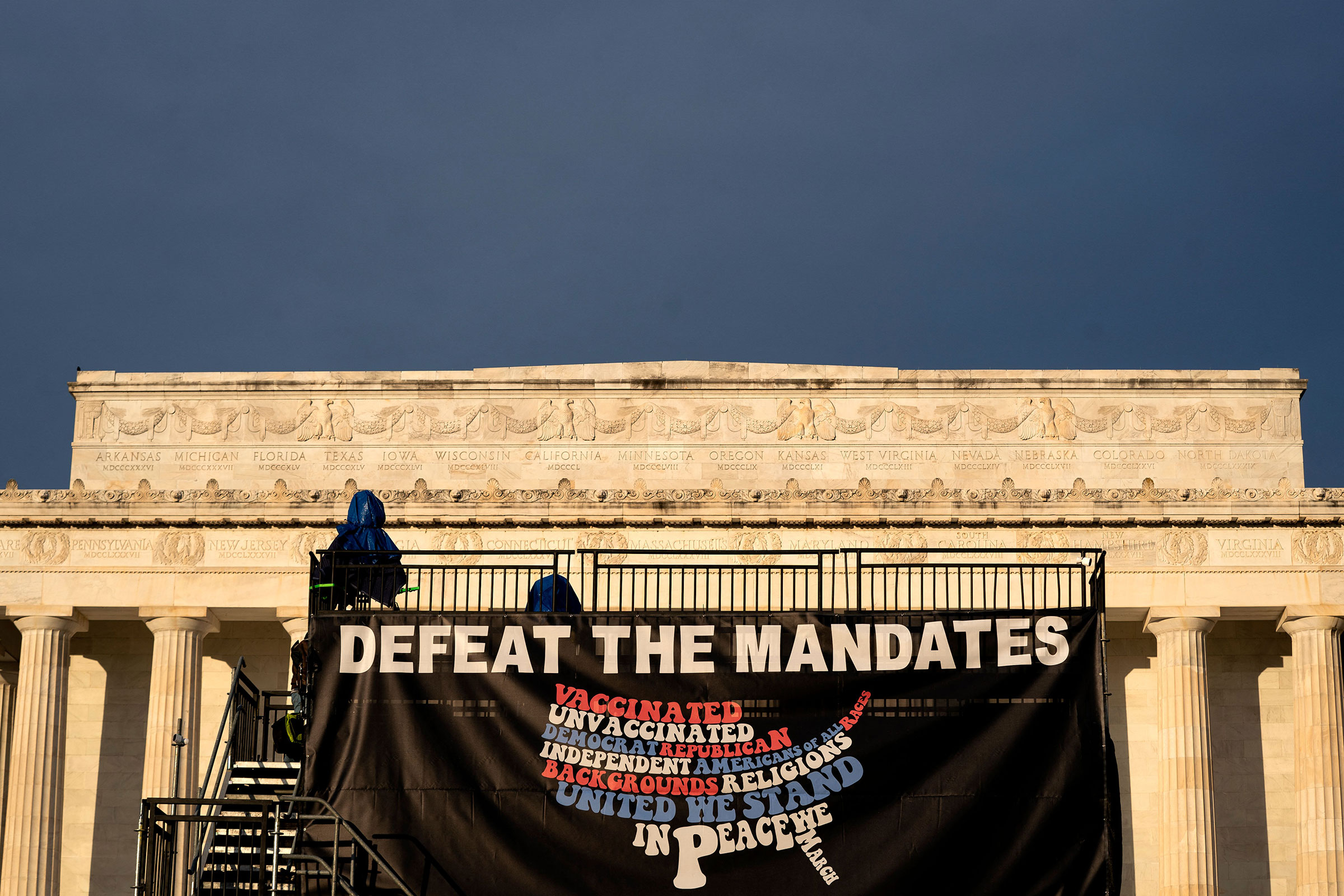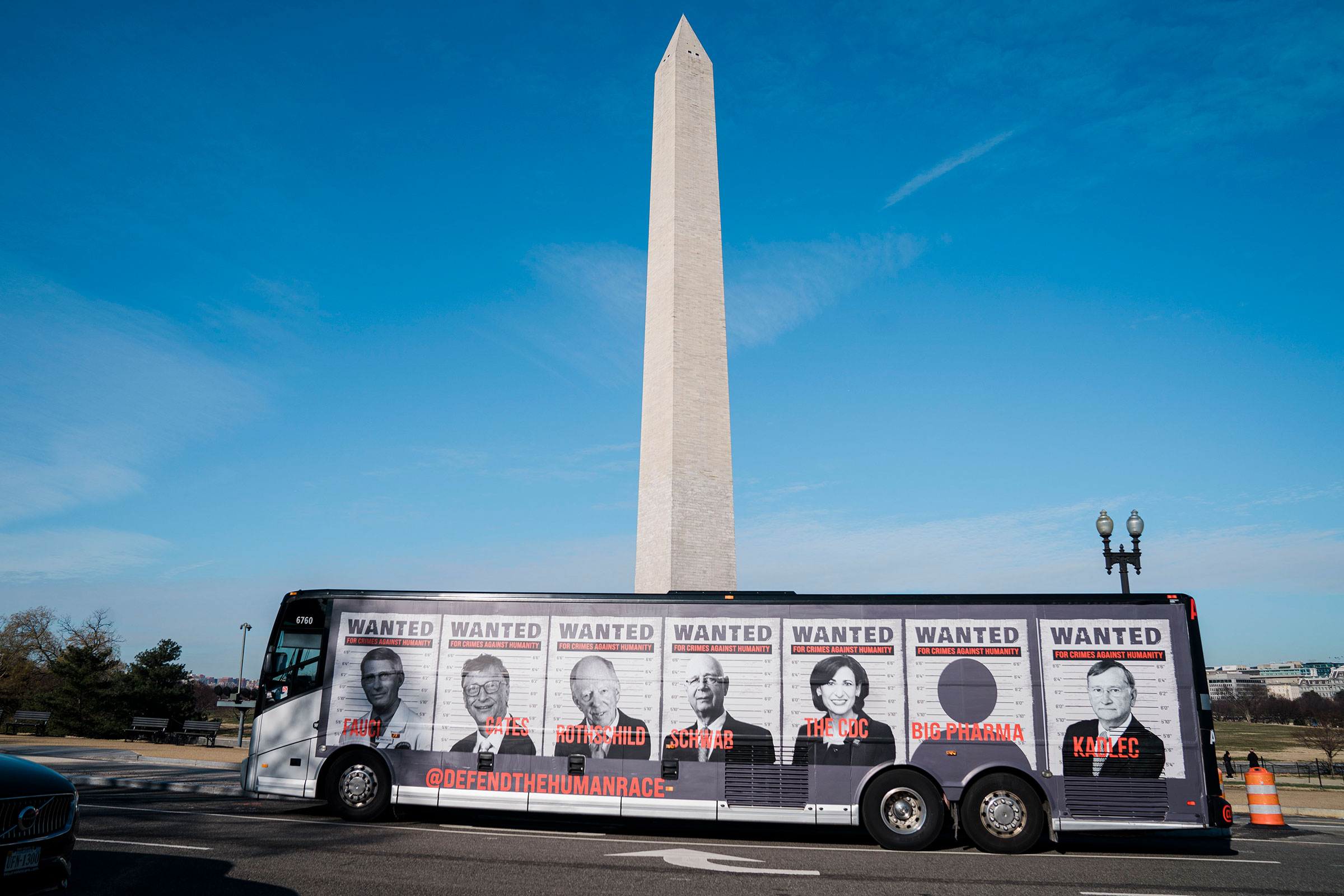
Lee Haywood got the COVID-19 vaccine. He’s seen friends lose their lives to the virus, and watched others struggle to recover. A smoker for 37 years, he believes the medical evidence showing that the vaccine sharply reduces his chances of a severe infection.
Yet on the frigid afternoon of Jan. 23, Haywood, a 61-year-old Republican running for a North Carolina congressional seat, was near the steps of the Lincoln Memorial in Washington, standing among signs that read “Vaccines kill” and “Stop the Vaccine Holocaust.” He had helped organize a bus carrying 35 people from Greensboro to the capital.
“I’m against the forced vaccinations or forced wearing of these masks by these bureaucrats deep in the bowels of the government,” Haywood says. “This country was founded on liberty, and these mandates just slap everybody in the face.”
Haywood’s presence at the “Defeat the Mandates” rally was a window into a growing political cause that is beginning to unite a host of groups across the right. The anti-vaccine movement, once a fringe cohort, has repositioned itself as an opposition to mandates and government overreach. The distinction has attracted legions of supporters by tapping into the anger, exhaustion, grief and frustration of millions of Americans as the pandemic enters its third year.
“Some people will try to paint it as an anti-vax movement, but it’s an anti-mandate movement,” Kevin Ryan, who identified himself as a U.S. Marine Corps veteran, said on a planning call Jan. 18. “If they understand that about us, we can attract a lot of people to our cause.”

The D.C. demonstration suggested Ryan was right. The spectacle was part Trump rally, part conspiracy convention, part protest. Groups of teachers and nurses mingled with firefighters and church groups. The yellow Gadsden flags adopted by the Tea Party a decade ago mixed with Trump 2020 placards, “Stop the Steal” signs and “F— Joe Biden” flags. A group of men wearing the insignia of the far-right Proud Boys lingered on the edges of the crowd, near a group of women wearing flower crowns and flashing peace signs as they took selfies with a “Mama Bears Against Mandates” board.
On stage, a host of anti-vaccine celebrities, from Robert F. Kennedy Jr. to right-wing doctors promoting alternative COVID-19 treatments, compared U.S. vaccination policies to Nazi Germany and the Soviet Union. Doctors in white coats falsely claimed that vaccines are “not working” and advocated for unproven treatments.
Read More: How America’s Frontline Doctors Sold Access to Bogus COVID-19 Treatments.
In the crowd, right-wing conspiracy theorists and vaccine skeptics mingled with libertarians, critics of “Big Pharma” and conservative politicians like Haywood. Fresh anger mixed with repackaged old grievances. Only a handful of the three-dozen rally-goers who spoke to TIME said their anti-vaccine stance predated COVID-19, but it was clear that it had become a defining marker of their political identity. Most cast their attendance as a fight against something larger—a way to channel their frustration with the government response to the pandemic, or an outlet for leftover resentment from the 2020 election. All of them said it would be their top priority when they next go to the polls.

“There’s no going back now,” says Addie Johnson, 43, who drove in from Virginia and says she has lost friends and family relationships over her anti-vaccination stance in the past year. “You’re either with this movement or against it.”
Already, opposition to vaccine and mask mandates has become a purity test for Republican officials, as well as a key part of their agenda ahead of this year’s midterm elections. It seems to have turned some of former President Donald Trump’s fervent supporters against him in favor of politicians like Florida Gov. Ron DeSantis, who has been coy about acknowledging his vaccination status and is not publicly backing such measures. Just 26% of Republicans say they consider vaccine mandates acceptable, according to a CNN poll last month, compared to 82% of Democrats. This partisan divide is evident in the vaccination data itself: unvaccinated adults are three times more likely to lean Republican than Democrat, according to a November analysis by the Kaiser Family Foundation.
Experts warn that the growing power of the joint anti-vaccine and anti-mandate movement could also provide cover to darker forces of anti-government sentiment. Organizers of the rally cast the event in the tradition of the 1960s civil rights movement, complete with hippie peace signs and tambourines. Yet the calls to action included some disturbing warning notes. In the context of the Jan. 6 insurrection at the U.S. Capitol and rising threats to public officials, the exhortations to “reclaim our country” and “refuse to comply” carried the implication of violence on the horizon. Some speakers threatened the press and Dr. Anthony Fauci, invoking the Nuremberg trials of leading Nazis. Leaning against a tree, a woman in a pink headband and sunglasses held a sign declaring in bold black and red letters: “Shoot those who try to kidnap and vaccinate your child.”

The coordination in the days before the rally illustrated the reach of the anti-mandate message. The event was promoted on Joe Rogan’s podcast, the most popular show on Spotify, as well as former Trump adviser Steve Bannon’s “War Room” podcast. Calls between organizers and attendees on the social audio app Clubhouse often stretched on several hours. Supporters, many of whom couldn’t attend the rally or don’t live in the U.S., shared information on Facebook and Telegram, offered to pay for one another’s bus tickets to Washington, and swapped advice on which restaurants and hotels wouldn’t require proof of vaccination. “IF YOU MISS THIS EVENT it will be like telling your grandkids YOU MISSED WOODSTOCK,” tweeted Del Bigtree, a TV producer who founded the anti-vaccine group Informed Consent Action Network and helped organize the rally.
The growing U.S. anti-vaccine movement is part of a global effort. The rally in Washington featured speakers from Israel and the U.K., and frequently referenced lockdown measures and mandates abroad. Photos and videos of the event were widely shared in large international anti-vaccine and far-right Telegram groups. The “Defeat the Mandates” rally was scheduled to coincide with global anti-vaccine protests organized by a far-right German group, under the banner “World Wide Rally for Freedom.” These events have often led to violence, including on Jan. 23, when protestors in Brussels clashed with police.
Make sense of what matters in Washington. Sign up for the D.C. Brief newsletter.
Planning calls for the D.C. demonstration reflected how the anti-mandate rallying cry, like other right-wing movements, has crossed borders in recent years. “I have cousins in Australia, and they’re waiting for the U.S. to have something huge like this,” one woman said on a Jan. 21 planning call ahead of the Washington rally. “People in other countries have been marching by the hundreds of thousands, and it’s really time for us to stand with them,” another man said.
Similar rallies like the one in Washington were scheduled at some state capitols across the country. Many seemed to be driven by the same narratives that pulled thousands of Americans into the QAnon conspiracy, with slogans like “Save the Children”— only this time, it was on behalf of groups with names like the Children’s Health Defense Fund, the political wing of Kennedy Jr.’s anti-vaccine organization, which falsely contends that thousands of children are being injured by vaccines.
Read More: QAnon Candidates Are Winning Local Elections. Can They Be Stopped?
The overarching goal is “to create a populist movement through the propagation of disinformation and to undermine well-respected American institutions,” says Nick Sawyer, an emergency-room physician who runs the group No License for Disinformation, which advocates for state medical boards to revoke the licenses of doctors who spread disinformation and prescribe unproven treatments. This “anti-science, anti-government movement” is taking advantage of a fringe group of doctors’ medical credentials to amplify and legitimize a harmful agenda, Sawyer says.
But what shocked Sawyer the most was “the blatantly partisan and violent nature of the speakers’ rhetoric.” The shadow of the Jan. 6, 2021 rallies—which culminated in the attack on the U.S. Capitol—seemed to linger over the event. “Unfortunately, many people who wanted to come were scared to join because of it being so close to Jan. 6,” says Kaitlin Derstine, who organized a bus to the rally from Pennsylvania, filled with nearly 50 people from a conservative parents’ group.


On a marathon seven-hour livestream of the rally, hundreds of participants were ecstatic. “They now know we are no longer a fringe group,” one participant said jubilantly. “What can we do next?” another woman asked. “I know there’s more.”
Organizers sought to funnel that energy towards political participation. They directed supporters to contact their members of Congress and their local government officials, and urged them to support a Jan. 24 panel hosted by Sen. Ron Johnson, a Wisconsin Republican, which featured some of the same speakers.
While no members of Congress were featured at the rally, some of them expressed their support on social media. “God bless all the brave people protesting against vaccine mandates!” Rep. Marjorie Taylor Greene, a Georgia Republican who has racked up more than $90,000 in fines for refusing to wear a mask on the House floor, wrote on Telegram. “I’m not vaccinated either and support medical freedom for all Americans.”
It’s clear the issue is a growing litmus test on the political right. Last summer, nearly half of House Republicans refused to say whether they had been vaccinated when asked by CNN. In Georgia, neither of the Republican frontrunners for the U.S. Senate nomination will say whether they received the vaccine. Earlier this month, a GOP city council member in New York City refused to disclose her vaccination status, even though doing so barred her from entering the chamber.

While Trump recently criticized DeSantis for declining to say whether he had received the booster, many of the rally goers were with DeSantis on the issue. Some carried DeSantis and “Make America Florida” banners. “You think Trump would get it after he’s gotten booed like ten times now,” said Holly, who did not want to give her last name but said she was 32-year-old nurse who had lost her job at a Houston hospital for refusing to get the vaccine. “Why does he want them to win?”
It’s this “us versus them” language that is uniting many of these groups and could make the movement a powerful political force, says Renee DiResta, who leads research on anti-vaccine disinformation at the Stanford Internet Observatory. DiResta predicts the movement will attempt to sink candidates who don’t malign vaccine mandates in upcoming GOP primaries. “That is the strategy I think we’ll see in 2022,” she says.
By uniting under an anti-mandate umbrella, groups and candidates supporting anti-vaccine and more extremist views will likely be able to evade moderation by social media platforms and organize online, DiRests says. “The ‘vaccines are tyrannical government overreach’ argument is still a permissible one that can be made, because [social media companies] don’t want to look like they’re putting their thumb on the scale of a political issue.”
Read More: How An Online Pharmacy Sold Millions Worth of Dubious COVID-19 Drugs—While Patients Paid the Price.
Haywood, the Republican candidate for the U.S. House of Representatives from North Carolina, says standing up against vaccine mandates will be a key part of his political platform. He also says he plans to keep up with what Kennedy Jr. and some of the other speakers at the rally continue to say. “It’s about taking a stand against the government,” he says. “They need to be routed out and brought to justice.”
More Must-Reads From TIME
- The 100 Most Influential People of 2024
- How Far Trump Would Go
- Scenes From Pro-Palestinian Encampments Across U.S. Universities
- Saving Seconds Is Better Than Hours
- Why Your Breakfast Should Start with a Vegetable
- 6 Compliments That Land Every Time
- Welcome to the Golden Age of Ryan Gosling
- Want Weekly Recs on What to Watch, Read, and More? Sign Up for Worth Your Time
Write to Vera Bergengruen at vera.bergengruen@time.com